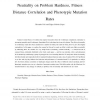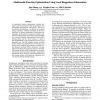131 search results - page 6 / 27 » Evolutionary Neuroestimation of Fitness Functions |
PPSN
2010
Springer
13 years 4 months ago
2010
Springer
This paper is concerned with a fixed-size population of autonomous agents facing unknown, possibly changing, environments. The motivation is to design an embodied evolutionary algo...
TEC
2012
11 years 9 months ago
2012
Kimura’s neutral theory of evolution has inspired researchers from the evolutionary computation community to incorporate neutrality into Evolutionary Algorithms (EAs) in the hop...
GECCO
2006
Springer
13 years 10 months ago
2006
Springer
1 Learnable Evolution Model (LEM) is a form of non-Darwinian evolutionary computation that employs machine learning to guide evolutionary processes. Its main novelty are new type o...
FOGA
2011
12 years 10 months ago
2011
The distribution of fitness values across a set of states sharply influences the dynamics of evolutionary processes and heuristic search in combinatorial optimization. In this p...
FLAIRS
2004
13 years 8 months ago
2004
In multimodal function optimization, niching techniques create diversification within the population, thus encouraging heterogeneous convergence. The key to the effective diversif...


